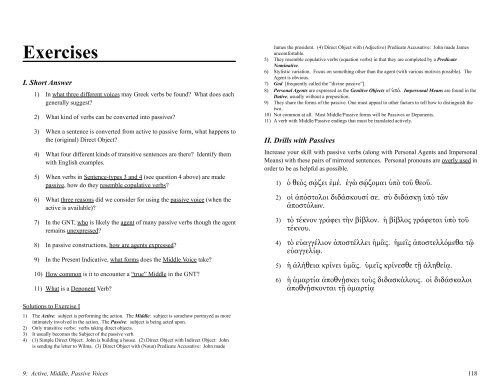Elementary New Testament Greek, 2014a
Elementary New Testament Greek, 2014a
Elementary New Testament Greek, 2014a
You also want an ePaper? Increase the reach of your titles
YUMPU automatically turns print PDFs into web optimized ePapers that Google loves.
Exercises<br />
I. Short Answer<br />
1) In what three different voices may <strong>Greek</strong> verbs be found? What does each<br />
generally suggest?<br />
2) What kind of verbs can be converted into passives?<br />
3) When a sentence is converted from active to passive form, what happens to<br />
the (original) Direct Object?<br />
4) What four different kinds of transitive sentences are there? Identify them<br />
with English examples.<br />
5) When verbs in Sentence-types 3 and 4 (see question 4 above) are made<br />
passive, how do they resemble copulative verbs?<br />
6) What three reasons did we consider for using the passive voice (when the<br />
active is available)?<br />
7) In the GNT, who is likely the agent of many passive verbs though the agent<br />
remains unexpressed?<br />
8) In passive constructions, how are agents expressed?<br />
9) In the Present Indicative, what forms does the Middle Voice take?<br />
10) How common is it to encounter a “true” Middle in the GNT?<br />
11) What is a Deponent Verb?<br />
James the president. (4) Direct Object with (Adjective) Predicate Accusative: John made James<br />
uncomfortable.<br />
5) They resemble copulative verbs (equation verbs) in that they are completed by a Predicate<br />
Nominative.<br />
6) Stylistic variation. Focus on something other than the agent (with various motives possible). The<br />
Agent is obvious.<br />
7) God [frequently called the “divine passive”].<br />
8) Personal Agents are expressed as the Genitive Objects of . Impersonal Means are found in the<br />
Dative, usually without a preposition.<br />
9) They share the forms of the passive. One must appeal to other factors to tell how to distinguish the<br />
two.<br />
10) Not common at all. Most Middle/Passive forms will be Passives or Deponents.<br />
11) A verb with Middle/Passive endings that must be translated actively.<br />
II. Drills with Passives<br />
Increase your skill with passive verbs (along with Personal Agents and Impersonal<br />
Means) with these pairs of mirrored sentences. Personal pronouns are overly used in<br />
order to be as helpful as possible.<br />
1) μ. μ .<br />
2) . <br />
.<br />
3) . <br />
.<br />
4) μ. μ μ <br />
.<br />
5) μ. μ .<br />
6) μ . <br />
μ<br />
Solutions to Exercise I<br />
1) The Active: subject is performing the action. The Middle: subject is somehow portrayed as more<br />
intimately involved in the action. The Passive: subject is being acted upon.<br />
2) Only transitive verbs: verbs taking direct objects.<br />
3) It usually becomes the Subject of the passive verb.<br />
4) (1) Simple Direct Object: John is building a house. (2) Direct Object with Indirect Object: John<br />
is sending the letter to Wilma. (3) Direct Object with (Noun) Predicate Accusative: John made<br />
9: Active, Middle, Passive Voices<br />
118


















